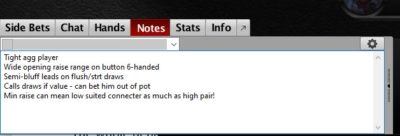Take Notes on Your Opponents to Increase Profit
You might have heard of the phrase ‘Play the player, not the cards.’ The idea behind the statement is a little outdated because poker has moved on a great deal since poker faces and picking up on tells were the big thing.
While many tells – signs that a player subconsciously gives off to reveal the real strength of his or her hand – are indeed true, good players know this and can double bluff by deliberately showing a tell to confuse an opponent. For example, taking a sip from a water bottle was once supposed to be a sign of anxiousness or weakness. A good player might, therefore, drink in this way, hoping his opponent believes him to be weak… only to walk straight into a full house.
The whole debate about live tells means nothing in online poker, of course. Here, you don’t get to see your opponent, hear them talk, or see how they handle their chips.
Watch for Betting Patterns
What you can do is study their playing patterns using a HUD, which will help you better predict what they might do next. But while HUDS are all well and good, not everyone has them. And anyway, nothing beats good, old-fashioned note-taking on players to build a picture of how they play.
Every online poker room has a note take facility. You simply click on the player avatar or name and see the option to take a note. When you add one, the avatar always has a label to show you a note is in place, perfect for when you stumble upon the player again weeks, months, or even years later.
What Notes Should You Take on Players?
While you would think the more notes you take, the better, it’s not that simple. You might not be a fast typist, for one thing, and spending too long trying to write a note, even in abbreviated form, means you may miss out on an essential piece of the action.
It is best to keep things as straightforward as possible. Certainly, enough to have a basic idea of how a player performs. If you are new to the game, then start practicing with notes immediately, so it becomes a habit. You can do this risk-free if you play free poker games to gain confidence.
Colour Labels
Some poker rooms provide a coloured label system you can apply to a player name. You might, for example, have green for a calling station fish, blue for a rock who only puts in a bet with a monster, and red for a tight-aggressive player who could get you in trouble.
Colour labelling players at your table is fine, so long as you update the colours as you learn more about an opponent. Where once you had the player down as a calling station, you might find after a few hundred hands on the same table that, in fact, his range is tighter, and he does not get involved in so many pots.
Just relying on colours is not ideal. You should train yourself to write occasional notes, too, which should be an essential part of any poker coaching. There is no point in recording everything you notice. After one or two long sessions against the same player, you will have made so many notes that making sense of them if you meet again weeks later will take far too much time.
Example Questions for Note-Taking
It’s best to keep your notes to top-level ones that you can use to help future decisions. Here are some examples you might add to your list:
- Does the player pay too much for draws, and too often?
- Does he call out of position with weak hands?
- Does he always min-bet monsters pre and post-flop?
- Does a check-raise always mean the nuts?
- Does he semi-bluff bet flush or straight draw?
- Does he routinely open-raise on the button or cut off?
- Does he always make a continuation bet, even if missing on the flop?
If you manage to build three or four of these notes on a particular player, you are in a much stronger position to make profitable calls or folds when you play them next.
Sometimes the difference between losing or making a profit in poker is wafer-thin. Some solid note-taking might be just what you need to move you into profitable play.
Reverse Engineering
While observing and taking notes on opponents is undoubtedly a good thing, don’t concentrate on it so much that you forget what image you are portraying to them. Your own play might be so robotic that a skilled opponent will be making notes on your style. This negates any advantage you had.
Take a cue from top players like Daniel Negreanu. He will mix up play so that opponents can never easily classify him one way or another. Sure, min-bet with aces or kings one time, but open with a bet of four times the big blind on another occasion. Semi-bluff with a flush draw occasionally but elect to check to see a cheap turn or river another time.



